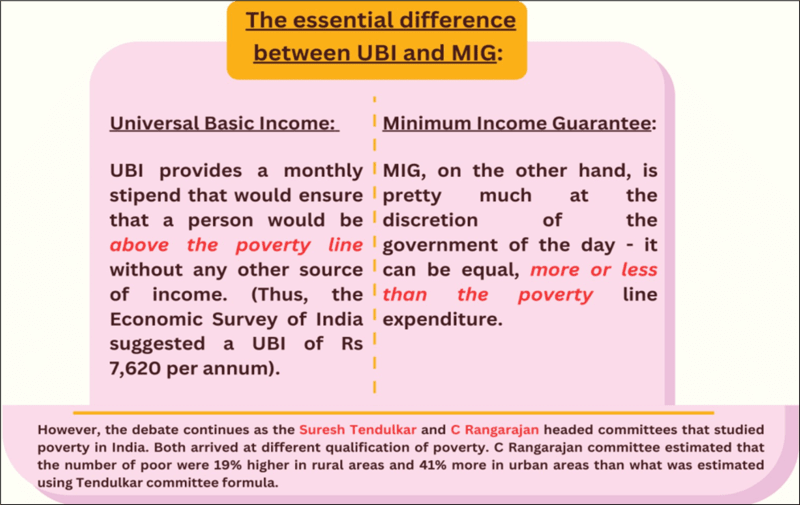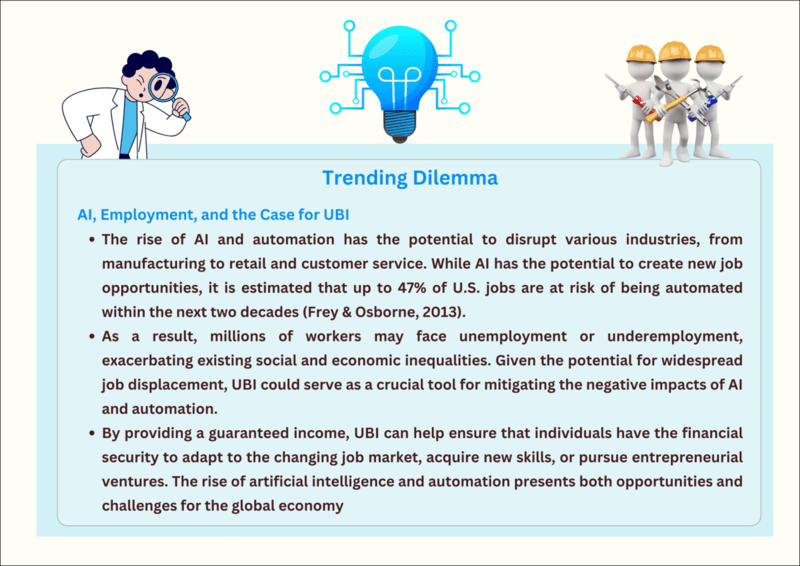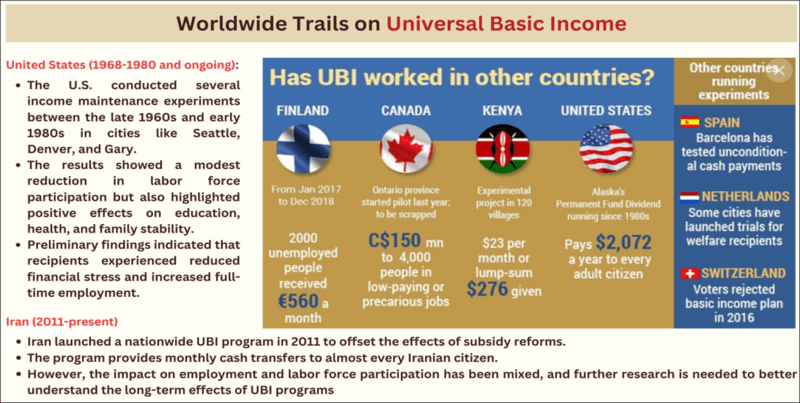Universal Basic Income
|
You will have much more influence by giving or lending money where it is wanted, than by hospitality. - Samuel Johnson |
Relevance: GS II and III (Social Justice and Economy)
- Prelims: Universal Basic Income; Economic Survey;
- Mains: Universal Basic Income and Government Initiatives; Pros and Cons; AI and associated issues
Why in News?
Localized experiments with universal basic income have shown mostly positive outcomes across states, strengthening calls in favour of the social policy

What is Universal Basic Income (UBI)?
- Universal basic income is a form of social security where every citizen, regardless of their employment status or income level, receives a regular, unconditional cash payment from the government.
- Objective: To provide financial security and reduce poverty, while also enabling individuals to pursue education, entrepreneurship, or other opportunities that contribute to societal well-being.
- In 2016-17, the Economic Survey of India studied the idea and presented a model for UBI. The basic premise of the Economic Survey's UBI was: "A just society needs to guarantee to each individual a minimum income which they can count on, and which provides the necessary material foundation for a life with access to basic goods and a life of dignity"

Why Universal Basic Income is supposed to be a solution to overcome the loopholes present in government services?
- Cash, as a universal medium of exchange, has the unique potential to provide each person with a basic economic floor and empower them to meet their needs as they deem fit.
- India’s diversity has always thrown up unique governance challenges for example - A tribal woman in Assam, a young graduate in Delhi, a landless labourer in Maharashtra belonging to a marginalized caste and a homemaker in Peri-urban Tamil Nadu all have diverse and distinct needs.
- Distribution of sewing machines to empower women misses the key step of asking them if tailoring is the path they want to pursue, or if employment is even the biggest challenge they are facing at the time.
- This is not to say that good quality and accessible government services are not essential. However, the addition of cash-based support allows for protecting and enhancing people’s capacity to access better services.
Additionally, the universality and unconditionality of the scheme would mean that the government does not need to spend time and resources assessing the eligibility of the potential beneficiaries, and poor and vulnerable people are freed from the burden of such paperwork. In a country with inadequate documentation and awareness, such a scheme provides the state with the best chance of robust coverage.

Pros of Universal Basic Income
- Poverty reduction: By providing a basic level of income, UBI can help lift millions of people out of poverty, addressing income inequality and ensuring a safety net for those who may not have access to traditional forms of assistance.
- Gender Equality: UBI could have a positive impact on gender equality. By providing women with financial independence, the policy could empower them to escape abusive relationships or invest in their own education and personal development.
- Stimulating the economy: Regular cash injections into the economy can increase consumer spending, boosting businesses and promoting economic growth.
- Providing the foundation for any growth opportunities: As mentioned, several UBI trials have shown that it does not necessarily lead to people quitting their jobs or working less. Instead, it can provide a foundation for individuals to pursue meaningful work, education, or other opportunities. However, it’s important to note that these trials have been relatively small and limited in scope.
- Encouraging innovation and entrepreneurship: With financial stability ensured, individuals may be more willing to take risks, pursue creative endeavours, or start their own businesses.
- Reducing bureaucracy: A simplified and streamlined welfare system could lead to cost savings for governments and reduce the stigma associated with receiving assistance.
Cons of Universal Basic Income:
- Issue in addressing diverse problems: Designing a UBI program that effectively addresses the diverse needs of India’s population and regional disparities also presents a significant challenge.
- High cost and inflation: The high cost of such a program could strain public finances, potentially necessitating tax increases or cuts in other public services. Critics also worry that an influx of cash into the economy might lead to inflation, eroding the value of basic income payments.
- Taxes, deficits, and productivity: Implementing UBI could lead to a more efficient welfare system, increased consumer spending, and economic growth. However, the costs associated with a large-scale UBI program could be significant, and funding it might require tax increases or reallocation of resources from other public services.
- It is vital to carefully analyze the long-term fiscal implications of UBI and ensure that it remains sustainable and does not disproportionately burden specific segments of the population or discourage productivity.
- Disincentivizing work: Critics argue that providing unconditional income may discourage individuals from seeking employment, potentially leading to labour shortages and decreased productivity.
- Nurturing the culture of dependency: Without any conditions for access to cash support, people may tend to stop working. This may also lead to mindless expenditures and add to debt.
- Inflation: Some economists worry that a sudden increase in consumer spending could lead to inflation, eroding the value of the basic income payments.
- Large-scale implementation of UBI may have different outcomes, and it is crucial to analyze the long-term effects on work ethic and motivation in the context of various demographics and regional differences.

Way Forward:
- Need for detailed analysis and diverse mechanism: Implementing rent caps and price indexes might have varying impacts across different regions and market conditions, and the ability to adjust UBI might require close monitoring and fine-tuning.
- The conversation about UBI is multifaceted and requires careful analysis and consideration of various factors, including the impact of AI on the job market. The ideas presented in the post can contribute to the ongoing debate and help develop a more comprehensive understanding of the potential advantages and challenges of implementing UBI.
- Accommodating diverse workforce: Addressing the notion that everyone should learn a trade, it’s important to recognize that different individuals have unique skills, interests, and constraints. The job market must accommodate a diverse workforce, and UBI could potentially provide the necessary support and flexibility for individuals to find suitable work or pursue education and entrepreneurship.
- Monitoring: Finally, ensuring that UBI payments reach the intended beneficiaries without being lost due to corruption or inefficiencies is crucial, especially given India’s large population and varied administrative capacities across states.
As policymakers and citizens grapple with the potential benefits and challenges, it remains to be seen whether UBI will emerge as a viable solution for India’s complex social and economic landscape.



